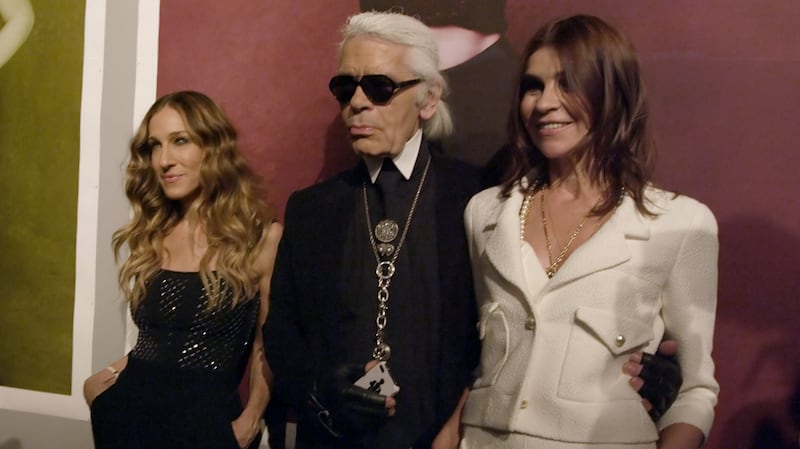
The Business of Fashion
Agenda-setting intelligence, analysis and advice for the global fashion community.

Agenda-setting intelligence, analysis and advice for the global fashion community.

The author has shared a YouTube video.
You will need to accept and consent to the use of cookies and similar technologies by our third-party partners (including: YouTube, Instagram or Twitter), in order to view embedded content in this article and others you may visit in future.
LONDON, United Kingdom — Fashion thrives on hagiography. It also loves magazines. And when the two come together on film, the industry is beside itself with joy. But whether much of this joy is actually felt by the broader cinema-going population is doubtful — and usually exaggerated by those behind the heist. Did the behind-the-scenes American Vogue documentary The September Issue really strike a chord with a wide range of people? After the release of Diana Vreeland: The Eye Has to Travel, did the legendary editor become a high-street folk heroine?
I think we know the answer.
What makes us imagine that such films will be interesting is, of course, the fact that they are nearly always built around a respected fashion personality with a degree of exoticism, if only the exoticism of power. But even more potently, they promise behind-the-scenes glimpses of a world not only exotic, but also closed to most people. And the feeling of privilege this brings is seductive.
The formula sometimes goes awry, of course. Who would have thought that Anna Wintour — the necessary decoy for everything nasty in fashion — would be so totally eclipsed on screen by the 'good guy' at American Vogue: the red-haired and eccentric Grace Coddington, who leapt out of obscurity to… well, continued obscurity for most of the world, I guess.
ADVERTISEMENT
Slick, glossy and shallow, films like these are marketing tools.
Yet the making of films purporting to show us life behind the scenes of fashion continues with the release of Mademoiselle C. As light as a puff of air, the movie is a very focused publicity piece for Carine Roitfeld, former editor of French Vogue and a great friend of Tom Ford and Karl Lagerfeld, who are both seen as money in the bank if filmmakers can get them on camera. And if they can add commentary from Riccardo Tisci and a few more designers currently perceived to be cool to give an opinion on how divinely gifted the heroine of this sub-genre biopic is, the hope is that the collective pulse of viewers begins to race and dollar signs light up the skyline.
We have lift-off. Or do we? And for what?
Slick, glossy and shallow, movies like these are marketing tools, just as much as the advertising films pushed out each season to sell new fragrances and lipstick colours. And in the case of Mademoiselle C, the film is as insulting to the subject as to the viewer.
Carine Roitfeld's achievements at Vogue were considerable. She brought to its fashion a Left Bank quirkiness and Pigalle je ne sais quoi that, in comparison, made all other Vogue magazines (apart from the Italian edition) seem like mere catalogues to use Diana Vreeland's devastating dismissal of Vogue under Grace Mirabella, the woman who replaced her as editor. But more than that, Roitfeld brought a coherent vision of modern femininity, sexual transgression and, frequently, bad taste that was as pungently and triumphantly Gallic as a Gauloise stubbed out in a garlic clove. And, of course, it was all presented with the high-gloss finish of a right-off-the-line Lamborghini.
Carine knows that we need three things from a French editor of a French magazine: the shock of the new; the articulation of the previously unsayable; and a high degree of gothic transgression from photographers and stylists. She brought them all together in a genius mix. And the resulting visual product was the true strength of her French Vogue.
Nobody did it better, but that doesn't mean that the story makes for an interesting film.
What desperate fear of the future prompted such a trail-blazing creator as Carine to agree to this film? What was the clinching argument? Why did she agree to such a crudely obvious glamour promotion? And is all the high-gloss decor — the helicopters, the shiny marble floors reflecting perfect Manolo heels, a playful wind machine giving a floaty Lanvin skirt just a little more float — really meant to reveal the future path "Mademoiselle C" will take?
In the fashion heartland, pulses may well be quickened by this sort of film, but surely the majority of us will remain unmoved. And, because this kind of response is in no way a reflection of how the international fashion industry rates and, indeed, needs this rather special lady, Mademoiselle C fails its subject as much as its audience.
From analysis of the global fashion and beauty industries to career and personal advice, BoF’s founder and CEO, Imran Amed, will be answering your questions on Sunday, February 18, 2024 during London Fashion Week.
The State of Fashion 2024 breaks down the 10 themes that will define the industry in the year ahead.
Imran Amed reviews the most important fashion stories of the year and shares his predictions on what this means for the industry in 2024.
After three days of inspiring talks, guests closed out BoF’s gathering for big thinkers with a black tie gala followed by an intimate performance from Rita Ora — guest starring Billy Porter.